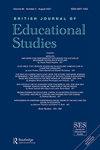Educational Equity: Pathways to Success
IF 1.7
3区 教育学
Q2 EDUCATION & EDUCATIONAL RESEARCH
引用次数: 2
Abstract
vividly defended within the book’s discussion of climate justice. Táíwò’s examination shows how the distribution of environmental risk and vulnerability within and across countries and populations is tied to the structural accumulation of advantages and disadvantage owing to the global racial empire. Signposting some pathways to justice, the book outlines the ‘targets and tactics’ that a constructive view of reparations could entail: unconditional cash transfers, global climate funding, abolishing tax havens, divesting from fossil fuels and investing in communities, not least community control and solidarity. In each, there are actors (institutions, states) who bear more of the burden to enact these shifts. But how might these liabilities be collectively recognised and agreed upon, especially by those required to give things up? Readers of this journal might recognise the potential role of education here: the deliberation that can be at the heart of pedagogic relationships; the possible impulse of education to co-create meaning, understanding and ideals. While education is, perhaps understandably, not a central theme within Reconsidering Reparations, there is much in it for the education theorist to pick up. After all, matters of epistemic justice, deliberation, and building new solidarities are key to the project of reparation as much as it is to the project of education. Moreover, the future-oriented view of reparation – its commitment to build something new – offers a framework for thinking through the futures of education too. The lens of reparation can offer a radical vision for education, one that goes beyond the piecemeal incrementalism of reform which by and large leave the conditions of educational injustice in place. Instead, a ‘reparative future of education’, as I have written about elsewhere, is one that seeks to redress the injustices of education, both past and present, so that these are not carried into tomorrow’s systems of education. As Táíwò recognises, the task of justice has always been large. I can imagine this is why he framed this book around the Malê Revolt against slavery in Brazil; the Malê knew another world is possible – and as Táíwò helps us see, in 1835 they ‘continued a fight that we can help finish’ (p.213).教育公平:成功之路
在书中对气候正义的讨论中生动地进行了辩护。Táíwå的研究表明,环境风险和脆弱性在国家和人口内部和之间的分布如何与全球种族帝国造成的优势和劣势的结构性积累联系在一起。这本书标志着一些伸张正义的途径,概述了建设性赔偿观可能需要的“目标和策略”:无条件现金转移、全球气候融资、废除避税天堂、放弃化石燃料和投资社区,尤其是社区控制和团结。在每一个国家,都有行为者(机构、州)承担着实施这些转变的更多负担。但是,如何集体确认和同意这些负债,尤其是那些被要求放弃的负债?这本杂志的读者可能会认识到教育在这里的潜在作用:思考可能是教育关系的核心;教育共同创造意义、理解和理想的可能冲动。虽然教育不是《重新考虑赔偿》的中心主题,这也许是可以理解的,但教育理论家在其中有很多东西需要学习。毕竟,认识正义、深思熟虑和建立新的团结是赔偿项目的关键,也是教育项目的关键。此外,面向未来的赔偿观——它致力于建设新的东西——也为思考教育的未来提供了一个框架。赔偿的视角可以为教育提供一个激进的愿景,一个超越零碎渐进式改革的愿景,这种改革大体上保留了教育不公正的条件。相反,正如我在其他地方所写的那样,“教育的修复性未来”是一个寻求纠正过去和现在教育的不公正现象的未来,这样这些就不会被纳入明天的教育体系。正如Táíwå所认识到的那样,正义的任务一直很艰巨。我可以想象,这就是他围绕巴西反对奴隶制的马累起义撰写这本书的原因;马累人知道另一个世界是可能的——正如Táíwå帮助我们看到的那样,1835年,他们“继续了一场我们可以帮助完成的战斗”(第213页)。
本文章由计算机程序翻译,如有差异,请以英文原文为准。
求助全文
约1分钟内获得全文
求助全文
来源期刊

British Journal of Educational Studies
EDUCATION & EDUCATIONAL RESEARCH-
CiteScore
4.50
自引率
5.30%
发文量
36
期刊介绍:
The British Journal of Educational Studies is one of the UK foremost international education journals. It publishes scholarly, research-based articles on education which draw particularly upon historical, philosophical and sociological analysis and sources.
 求助内容:
求助内容: 应助结果提醒方式:
应助结果提醒方式:


